Passerines
Systematic List
Part VI: Passerines
Note: All dates refer to April 2006 except where specified.
Species in pink are likely to be of most interest to British birders
__________
CALANDRA LARK Melanocorypha calandra (Calhandra-comum)
A total of 10 seen in two locations: east of Mourão (in Spain) 2 on 21st and 3 on 22nd and between Mértola and Castro Verde 3 on 24th and 2 on 25th.
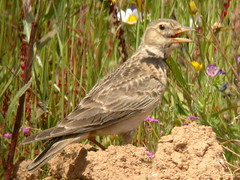
Calandra Lark, between Mértola and Castro Verde, 25th April
__________
SHORT-TOED LARK Calandrella brachydactyla (Calhandrinha-comum)
At least 10 at Ponta da Erva on 19th and 20th. Elsewhere 1 east of Mourão (Spain) on 22nd and 1 east of Mértola on 25th.
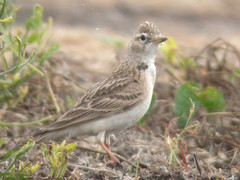
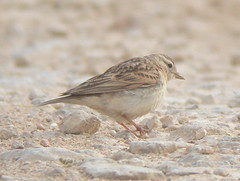
Short-toed Larks, Ponta da Erva, 20th April
__________
LESSER SHORT-TOED LARK Calandrella rufescens (calhandrinha das marismas)
Up to 10 at Castro Marim on 27th, 30th and 1st May.
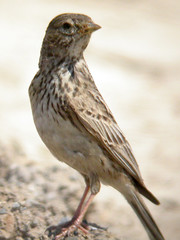
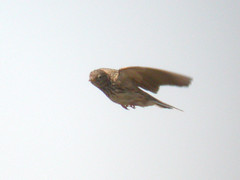
Lesser Short-toed Larks, Castro Marim, 30th April
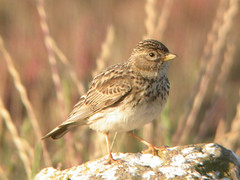
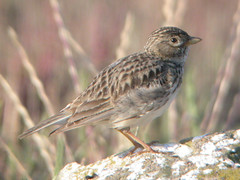
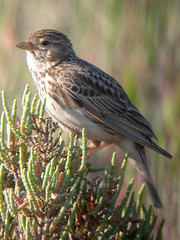
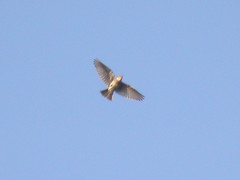
Lesser Short-toed Larks, Castro Marim, 1st May
__________
CRESTED LARK Galerida cristata (Cotovia-de-poupa)
The commonest and most widespread lark with best counts of 25 between Mértola and Castro Verde on 24th and 25th.
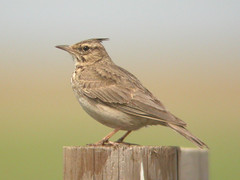
Crested Lark, east of Mourão, 21st April
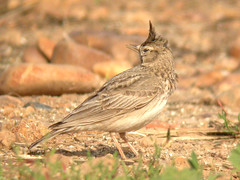
Crested Lark, Elvas, 24th April
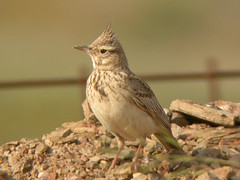
Crested Lark, between Mértola and Castro Verde, 24th April
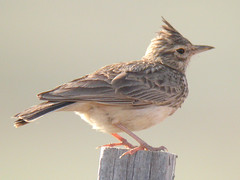
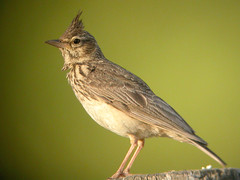
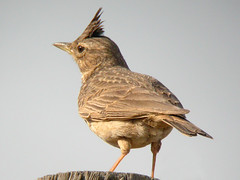
Crested Lark, between Mértola and Castro Verde, 25th April (lower bird showed some features of Thekla, but was probably Crested?)
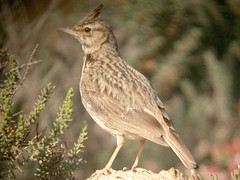
Crested Lark, Castro Marim, 1st May
__________
THEKLA LARK Galerida theklae (Cotovia-montesina)
First identified in the hills north of Santa Catarina da Fonte do Bispo on 15th. A difficult bird to identify though habitat seemed to provide a good clue with this species more likely to be encountered in shrubby hilly areas. At least 15 were identified east of Mértola on 25th and birds to the west of Mértola included both species on 25th and 26th. Others were suspected but not positively identified at Azinhal.
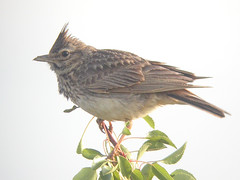
Thekla Lark, east of Mértola, 25th April
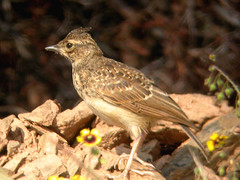
juvenile Thekla Lark, west of Mértola, 26th April
__________
WOODLARK Lullula arborea (Cotovia-pequena)
A total of 7 seen at 5 inland locations.
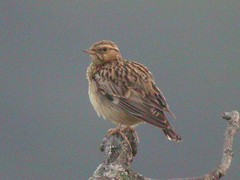
Woodlark, north of Bispo, 16th April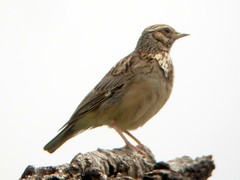
Woodlark, Cortelha, 16th April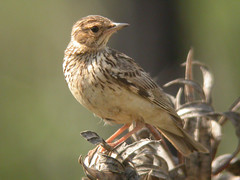
Woodlark, west of Mértola, 26th April
__________
SKYLARK Alauda arvensis (Laverca)
Up to 20 seen at Ponta da Erva on 19th and 20th.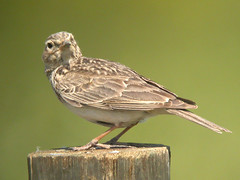
Skylark, Ponta da Erva, 19th April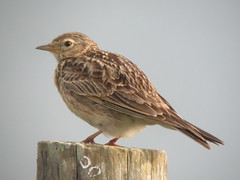
Skylark, Ponta da Erva, 20th April
__________
SAND MARTIN Riparia riparia (Andorinha-das-barreiras)
Up to 6 seen at the following sites: Tomar, Marinhas do Samouco, Barroca d’Alva and Elvas.
__________
CRAG MARTIN Ptyonoprogne rupestris (Androinha-das-rochas)
Pairs seen at each of the monasteries at Tomar, Batalha and Alcobaça on 18th, with 6 birds at the latter site. Elsewhere in the vicinity of Mértola 6 on 25th and 3 on 26th. Finally 1 at Carrapateira on 28th.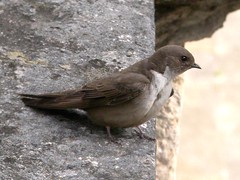
Crag Martin, Tomar, 18th April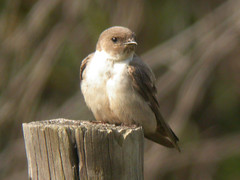
Crag Martin, west of Mértola, 26th April
__________
SWALLOW Hirundo rustica (Andorinha-das-chaminés)
Very common everywhere.
__________
RED-RUMPED SWALLOW Cecropis daurica (Andorinha-dáurica)
Commoner than expected with a total of 22 seen at a variety of locations. More in the Alentejo than anywhere else, including 5 west of Mértola on 26th.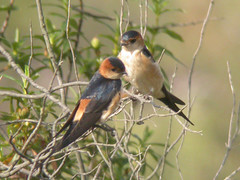
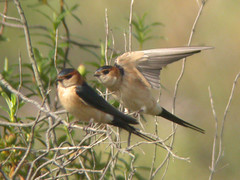
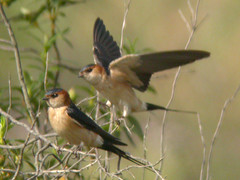
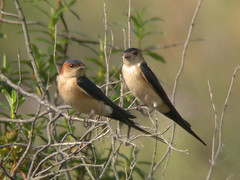
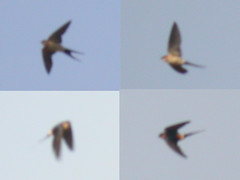
Red-rumped Swallows, west of Mértola, 26th April
__________
HOUSE MARTIN Delichon urbica (Andorinho-dos-beirais)
Common everywhere.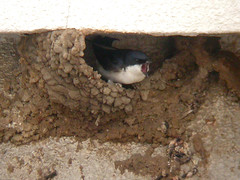
House Martin, Elvas, 23rd April
__________
BLUE-HEADED WAGTAIL Motacilla flava flava (Alvéola-amarela)
One male at Castro Marim on 27th was presumably a migrant.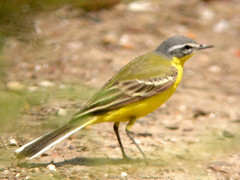
Blue-headed Wagtail, Castro Marim, 27th April
__________
SPANISH WAGTAIL Motacilla flava iberiae (Alvéola-amarela)
Fairly common in the Algarve and around the Tejo Estuary, particularly at Ponta da Erva where about 40 on 19th.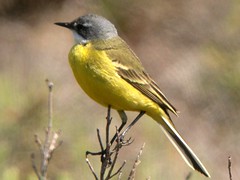
Spanish Wagtail, Quinto do Lago, 15th April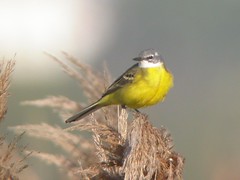
Spanish Wagtail, Barroca d'Alva, 19th April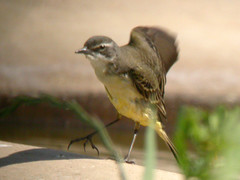
Spanish Wagtail, Ponta da Erva, 19th April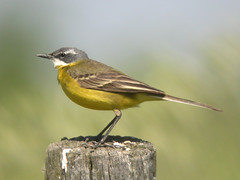
Spanish Wagtail, Ponta da Erva, 20th April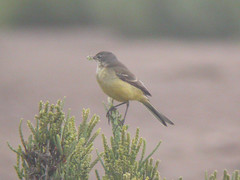
Spanish Wagtail, Castro Marim, 27th April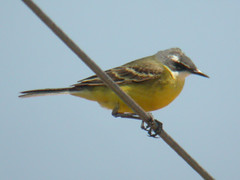
Spanish Wagtail, Castro Marim, 1st May
__________
GREY WAGTAIL Motacilla cinerea (Alvéola-cinzenta)
One at Tanoeiro on 28th.
__________
WHITE WAGTAIL Motacilla alba alba (Alvéola-branca)
On 18th, 1 at Tomar, 2 feeding young at Batalha and 4 at Lagne de Óbidos.
__________
WREN Troglodytes troglodytes (Carriça)
Singles seen or heard at 4 locations: Santa Catarina, Lisbon, Tomar and Tareja.
__________
ROBIN Erithacus rubecula (Pisco-de-peito-ruivo)
Seen or heard at 3 locations between Tomar and Óbidos on 18th and then 1 heard at Sintra on 20th.
__________
NIGHTINGALE Luscinia megarhynchos (Rouxinol-comum)
Common and widespread with birds heard singing at several locations. One was singing right out on the open at Elvas on 23rd with 2 more singing in full view nearby on 24th.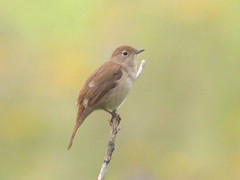
Nightingale, Elvas, 23rd April
__________
BLACK REDSTART Phoenicurus ochruros (Rabirruivo-preto)
Eight seen at 5 locations, all on 18th: 1 at Lisbon, 3 males at Tomar, 1 between Tomar and Batalha, 2 at Batalha and 1 at Óbidos.
__________
REDSTART Phoenicurus phoenicurus (Rabirruivo-de-testa-branca)
A male along the N2 at Cortelha on 16th was the only sighting.
__________
WHINCHAT Saxicola rubetra (Cartaxo-nortenho)
Only one observation, in Spain: 1 east of Mourão on 21st.
__________
STONECHAT Saxicola torquata (Cartaxo-comum)
Common and widespread with perhaps as many as 60 at Ponta da Erva on 19th.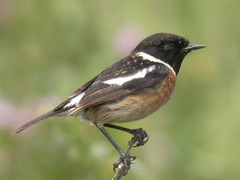
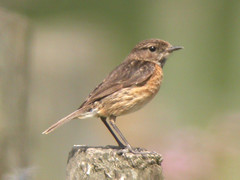
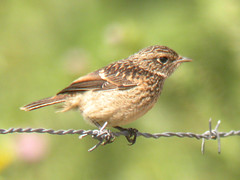
Stonechats, Pancas, 19th April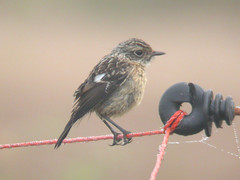
Stonechat, Castro Marim, 27th April
__________
NORTHERN WHEATEAR Oenanthe oenanthe (Chasco-cinzento)
One at Azinhal on 28th was the only sighting.
__________
BLACK-EARED WHEATEAR Oenanthe hispanica (Chasco-ruivo)
A black-throated male and 2 females east of Mourão (Spain) on 22nd with 1 there next day. Between Mértola and Castro Verde 2 males on 24th and 2 males and a female on 25th including both black-throated and pale-throated forms. Finally 1 at Nora on 28th.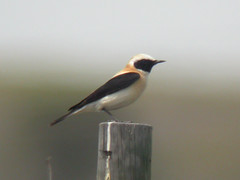
Black-eared Wheatear, between Mértola and Castro Verde, 25th April
__________
BLUE ROCK THRUSH Monticola solitarius (Melro-azul)
A wrong turn in Alcoutim on 26th found us in a building site where a splendid male Blue Rock Thrush was singing from the top of a crane.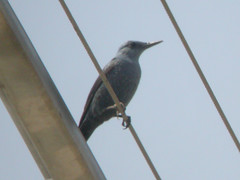
Blue Rock Thrush, Alcoutim, 26th April
__________
BLACKBIRD Turdus merula (Melro-preto)
Common everywhere. Iberian birds were distinctly greyer than British-breeding birds and seemed slightly different structurally too.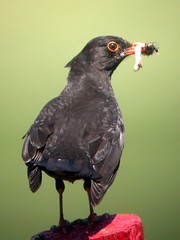
Blackbird, Quinta do Lago, 15th April
__________
MISTLE THRUSH Turdus viscivorus (Tordeia)
One on a lawn at Ludo Farm on 29th and 30th.
__________
CETTI'S WARBLER Cettia cetti (Rouxinol-bravo)
Common in most areas, so long as there was water nearby. Birds perched out in the open not infrequently, though rarely for long.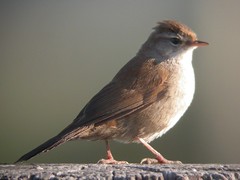
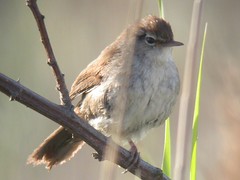
Cetti's Warblers, Barroca d'Alva, 19th April
__________
FAN-TAILED WARBLER Cisticola juncidis (Fuinha-dos-juncos)
Very common with getting on for 150 recorded (many of them heard but not seen). Most numerous at Ponta da Erva where at least 30 on 19th.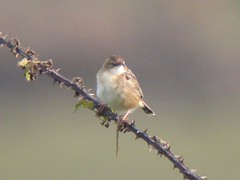
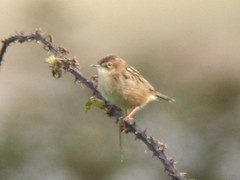
Fan-tailed Warbler, Lagne de Óbidos, 18th April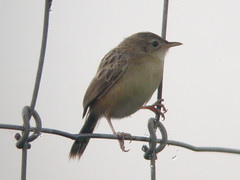
Fan-tailed Warbler, Castro Marim, 27th April
__________
REED WARBLER Acrocephalus scirpaceus (Rouxinol-pequeno-dos-caniços)
Small numbers (up to 3) recorded at Barroca d’Alva, Ponta da Erva, Elvas and Ludo Farm.
__________
GREAT REED WARBLER Acrocephalus arundinaceus (Rouxinol-grande-dos-caniços)
Common. In the Algarve 1 at Quinta do Lago on 15th and up to 2 at Ludo Farm on 29th and 1st May. Around Lisbon, 3 at Barroca d’Alva on 19th and 21st and up to 12 at Ponta da Erva on 19th and 20th. In the east, up to 4 east of Mourão (Spain) on 21st and 23rd and up to 3 at Elvas on 23rd and 24th.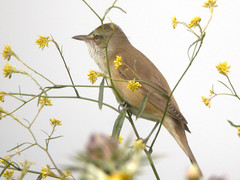
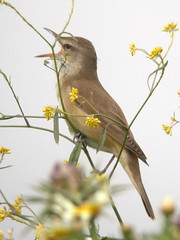
Great Reed Warbler, Ponta da Erva, 20th April
__________
MELODIOUS WARBLER Hippolais polyglotta (Felosa-poliglota)
Two along the N2 at Cortelha on 16th, 4 at Elvas on 23rd with 1 there the next day and 1 west of Mértola on 26th.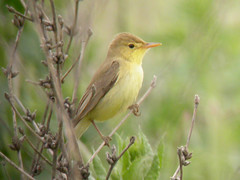
Melodious Warbler, Elvas, 23rd April
__________
DARTFORD WARBLER Sylvia undata (Felosa-do-mato)
One west of Mértola on 25th with 2 there on 26th. One at Azinhal on 28th and 29th. All were singing males.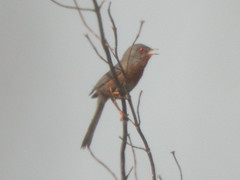
Dartford Warbler, west of Mértola, 26th April
__________
SUBALPINE WARBLER Sylvia cantillans (Toutinegra-carrasqueira)
Surprisingly only 1 was seen, a calling female outside the hotel at Mértola on 25th.
__________
SARDINIAN WARBLER Sylvia melanocephala (Toutinegra-de-cabeça-preta)
Very common with 88 recorded (probably including a little duplication). Scarcer in the Alentejo than other regions.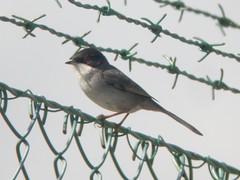
Sardinian Warbler, ETAR Waterworks (Montenegro), 15th April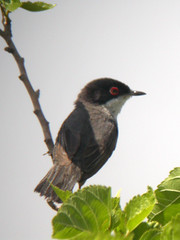
Sardinian Warbler, Castro Marim, 27th April
__________
WHITETHROAT Sylvia communis (Papa-amoras-comum)
One in the hills north of Santa Catarina da Fonte do Bispo on 16th.
__________
GARDEN WARBLER Sylvia borin (Felosa-das-figueiras)
One or two at Elvas on 24th.
__________
BLACKCAP Sylvia atricapilla (Toutinegra-de-barrette-preto)
Up to 2 seen at 4 locations: Cortelha, Tomar, Elvas and Tareja.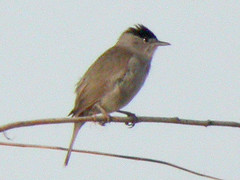
Blackcap, Elvas, 24th April
__________
IBERIAN CHIFFCHAFF Phylloscopus ibericus (Felosa-ibérica)
After much searching, 1 was finally found singing at Tareja (north of São Brás de Alportel). Eventually it was seen, though only briefly. An unidentified Phylloscopus warbler was seen briefly north of Santa Catarina on 16th.
__________
FIRECREST Regulus ignicapilla (Estrelinha-de-cabeça-listada)
One sang briefly from a bungalow’s television aerial at Tomar on 18th and 1 was heard singing along the road between Batalha and Alcobaça the same day.
__________
SPOTTED FLYCATCHER Muscicapa striata (Papa-moscas-cinzento)
One at Elvas on 24th.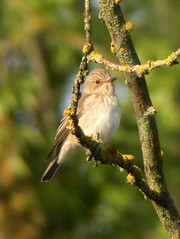
Spotted Flycatcher, Elvas, 24th April
__________
IBERIAN LONG-TAILED TIT Aegithalos caudatus irbii (Chapim-rabilongo)
Seen or heard at 4 locations: west of Santa Catarina on 16th, south of Alcoutim on 26th, Azinhal on 28th and Tareja on 29th.
__________
BLUE TIT Cyanistes caeruleus (Chapim-azul)
Not uncommon, small numbers seen at a variety of inland locations.
__________
GREAT TIT Parus major (Chapim-real)
Small numbers seen at a variety of locations, often the same places as the previous species.
__________
CRESTED TIT Lophophanes cristatus (Chapim-de-poupa)
Only seen in the central Algarve around Faro: 3 between Ludo and Quinta do Lago and 2 near Montenegro University on 15th, 4 at Ludo Farm on 29th and 2 there on 1st May, the last birds seen before returning to England.
__________
COAL TIT Periparus ater (Chapim-preto)
One heard between Batalha and Alcobaça on 18th.
__________
NUTHATCH Sitta europaea (Trepadeira-azul)
Two north of Santa Catarina da Fonte do Bispo on 16th and singles seen or heard along the N2 at Cortelha on 16th, Pancas on 19th and Tareja on 29th.
__________
SHORT-TOED TREECREEPER Certhia brachydactyla (Trepadeira-comum)
Two north of Santa Catarina da Fonte do Bispo on 16th.
__________
GOLDEN ORIOLE Oriolus oriolus (Papa-figos)
In the south, 9 of which 6 were seen: a male north of Santa Catarina da Fonte do Bispo on 16th, males at Azinhal and Tanoeiro and a pair at Castro Marim all on 28th and 3 at Azinhal and singles at São Brás de Alportel and Tareja, all on 29th. In the east, at least 3 around Mértola 25th-26th, but none of these were seen.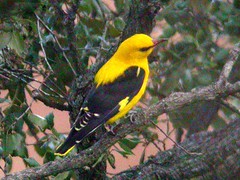
Golden Oriole, north of Bispo, 16th April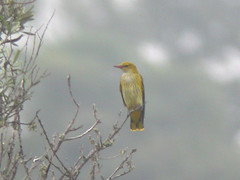
Golden Oriole, Azinhal, 29th April
__________
SOUTHERN GREY SHRIKE Lanius meridionalis (Picanço-real)
Common and conspicuous, particularly in the Alentejo, with a total of 67 seen. Best counts were 14 around Elvas on 23rd and 13 between Mértola and Castro Verde on 25th.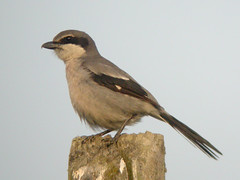
Southern Grey Shrike, west of Mértola, 24th April
__________
WOODCHAT SHRIKE Lanius senator (Picanço-barreteiro)
Common and widespread with a total of 73 seen. A total of 20 seen on 23rd, between Mourão, Badajoz (Spain) and Elvas.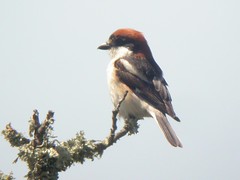
Woodchat Shrike, Quinta do Lago, 15th April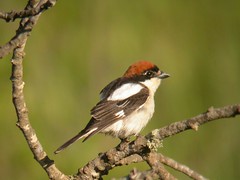
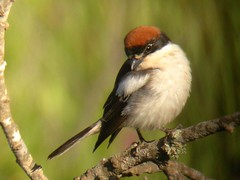
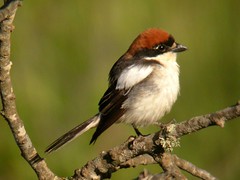
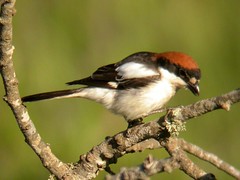
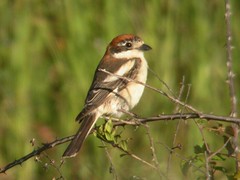
Woodchat Shrikes, north of Bispo, 15th April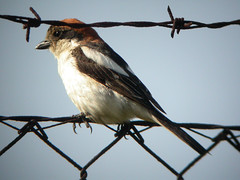
Woodchat Shrike, Ria Formosa, 27th April
__________
JAY Garrulus glandarius (Gaio-comum)
Fairly common with 14 seen at a variety of locations, mainly in the east and south.
__________
IBERIAN AZURE-WINGED MAGPIE Cyanopica (cyana) cooki (Pega-azul)
Very common, noisy and conspicuous in the south and east though none seen in the Lisbon area. The total of 177 birds seen included 24 between Mértola and Castro Verde on 25th and 20 going to roost (in 2 flocks) at Ludo Farm on 29th.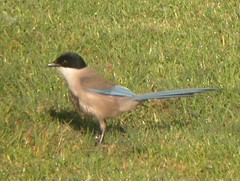
Azure-winged Magpie, near Quinta do Lago, 15th April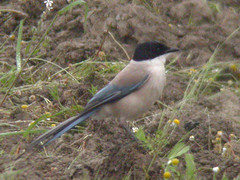
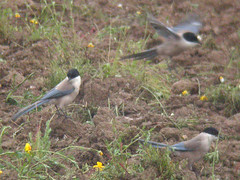
Azure-winged Magpies, east of Mourão, 22nd April
__________
MAGPIE Pica pica (Pega-rabuda)
Only seen in the Alentejo and at Castro Marim. Not particularly common.
__________
JACKDAW Corvus monedula (Gralha-de-nuca-cinzenta)
A few at Évora on 22nd.
__________
CARRION CROW Corvus corone (Gralha-preta)
Three at Lagne de Óbidos on 18th and 3 at Pancas on 19th were the only ones noted down, though I think I saw others which I didn’t make a note of.
__________
RAVEN Corvus corax (Corvo)
Singles seen at 4 locations, all in the east, and 3 east of Mourão (Spain) on 23rd.
__________
SPOTLESS STARLING Sturnus unicolor (Estorninho-preto)
Fairly common in most places, particularly in the Alentejo, the only region where counts exceeded 12 (up to 30). Over 200 seen in all.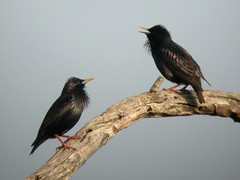
Spotless Starlings, Ludo Farm, 29th April
__________
CRESTED MYNA Acridotheres cristatellus (??)
Several at Carcavelos, along the coast west of Lisbon, on 20th. Birds were very mobile and rarely settled in view so obtaining a count was difficult. Between 5 and 10 birds were seen before I nearly got arrested photographing them – apparently the site was a NATO fort on red alert. Other than these, one seen in flight near the waterfront in central Lisbon on 21st.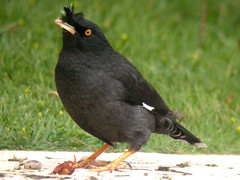
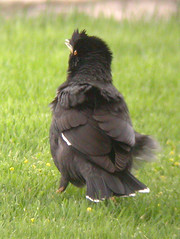
Crested Myna, Carcavelos, 20th April
__________
YELLOW-CROWNED BISHOP Euplectes afer (Bispo-de-coroa-amarela)
Four at Barroca d’Alva on 19th. A female Bishop at Ponta da Erva the same day may have been this species or was possibly an Orange Bishop Euplectes franciscanus.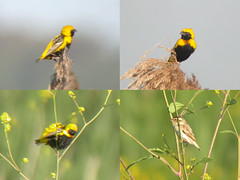
Yellow-crowned Bishops, Barroca d'Alva, 19th April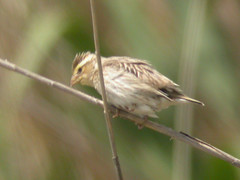
female Bishop sp., Ponta da Erva, 19th April
__________
RED-HEADED QUELEA Quelea erythrops (Quelea-de-cabeca-vermelha)
Two at Barroca d’Alva on 19th.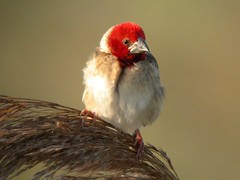
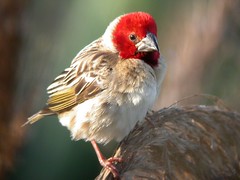
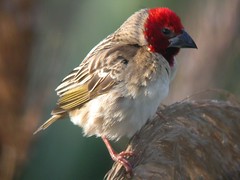
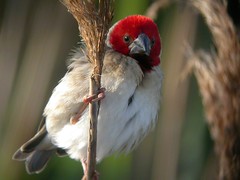
Red-headed Quelea, Barroca d'Alva, 19th April
__________
HOUSE SPARROW Passer domesticus (Pardal)
Very common in most areas – encouraging in view of their recent decline in the UK.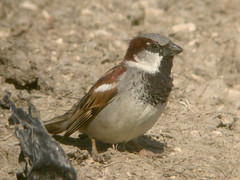
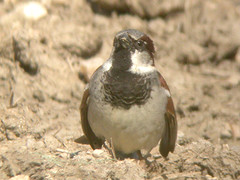
House Sparrow, Ponta da Erva, 19th April
__________
SPANISH SPARROW Passer hispaniolensis (Pardal-espanhol)
One at Ponta da Erva on 20th. Up to 60 east of Mourão (Spain) on 22nd and 23rd and in the Alentejo, 2 at Mourão on 22nd, at least 30 between Mértola and Castro Verde on 25th and at least 30 south of Mértola on 26th. Some of these were nesting in Storks’ nests (as were House Sparrows).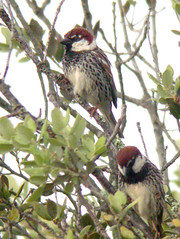
Spanish Sparrows, east of Mourão, 23rd April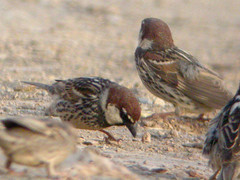
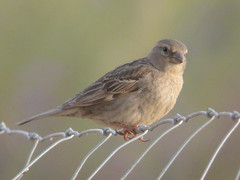
Spanish Sparrows, between Mértola and Castro Verde, 25th April
__________
TREE SPARROW Passer montanus (Pardal-montez)
Five (4 and a 1) at Elvas on 23rd and 2 at Tareja on 29th.
__________
ROCK SPARROW Petronia petronia (Pardal-francês)
Two east of Mourão (Spain) on 22nd and 23rd.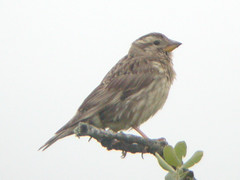
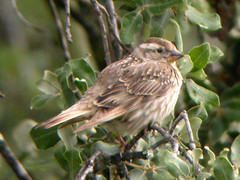
Rock Sparrow, east of Mourão, 25th April
__________
BLACK-HEADED WEAVER Ploceus melanocephalus (??)
This naturalised species was seen at 2 locations in the Algarve and 1 near Lisbon: three near Ludo and a pair at Quinta do Lago on 15th and 6 at Barroca d’Alva on 19th and 21st.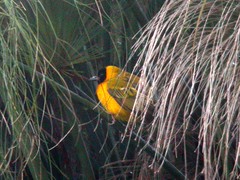
Black-headed Weaver, near Quinta do Lago, 15th April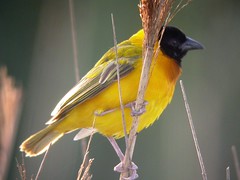
Black-headed Weaver, Barroca d'Alva, 19th April
__________
RED AVADAVAT Amandava amandava (Bengali-vermelho)
A flock of 6 near the River Guadiana at Elvas on 24th. None were red adult males.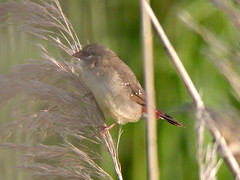
Red Avadavat, Elvas, 24th April
__________
COMMON WAXBILL Estrilda astrild (Bico-de-lacre)
Two at Barroca d’Alva on 16th with 3 there on 19th, 2 at Ponta da Erva on 20th and 3 near the River Guadiana at Elvas on 23rd.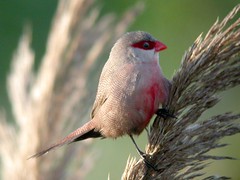
Common Waxbill, Barroca d'Alva, 19th April
__________
CHAFFINCH Fringilla coelebs (Tentilhão-comum)
One or two seen at 6 sites all in the south of the country.
__________
SERIN Serinus serinus (Chamariz-comum)
Very common, the commonest finch. A total of 188 recorded although that probably included some duplication. Particularly common north of Lisbon where 55 seen between Tomar and Alcobaça on 18th.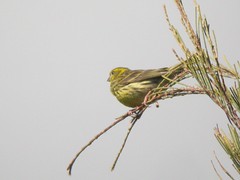
Serin, ETAR Waterworks (Montenegro), 15th April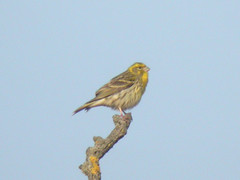
Serin, Elvas, 24th April
__________
GREENFINCH Carduelis chloris (Verdilhão-comum)
Common in some areas.
__________
GOLDFINCH Carduelis carduelis (Pintassilgo)
Very common in all areas, though usually less numerous than Serin.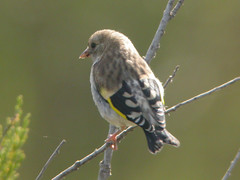
Goldfinch, Ria Formosa, 27th April
__________
LINNET Carduelis cannabina (Pintarroxo-comum)
About 10 at Ponta da Erva on 19th and fairly common in the Alentejo (and east of Mourão in Spain) with 10 at Elvas on 24th.
__________
ROCK BUNTING Emberiza cia (Cia)
Two singing males: 1 north of Santa Catarina da Fonte do Bispo on 15th and 1 along the N2 at Cortelha on 16th.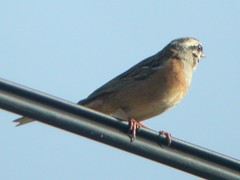
Rock Bunting, north of Bispo, 15th April
__________
REED BUNTING Emberiza schoeniclus (Escrevedeira-dos-caniços)
One at Quinta do Lago on 15th.
__________
CORN BUNTING Emberiza calandra (Trigueirão)
In the southern Algarve only seen in the far east around Castro Marim. Extremely common around Lisbon’s Tejo Estuary with about 60 at Ponta da Erva on 19th. In the Alentejo (and east of Mourão in Spain) this was one of the most, if not the most, abundant species of bird. Good to see such numbers in view of the sharp decline of this species in the UK.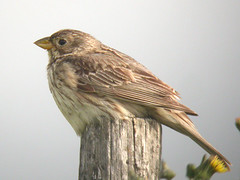
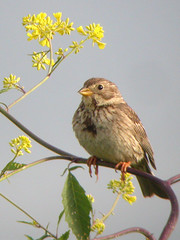
Corn Buntings, Ponta da Erva, 20th April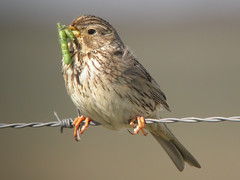
Corn Bunting, east of Mourão, 21st April
__________
Total of about 170-180 species of bird depending on what you count (e.g. naturalised species)
__________
Click here to go on to the final part of the systematic list: Non-avian wildlife
Part I: Wildfowl and Gamebirds
Part II: Grebes to Flamingo
Part III: Raptors to Bustards
Part IV: Shorebirds
Part V: Other non-passerines
Part VII: Other non-avian wildlife
Or to return to the overview of the regions visited, including very brief details of the main birding sites:
Algarve I - 14th to 16th April
Lisbon - 16th to 21st April
Alentejo - 21st to 26th April
Algarve II - 26th April to 1st May
2 Comments:
michael kors handbags outlet
michael kors selma
michael kors jet set tote
michael kors wallets
michael kors purses
michael kors factory
Michael Kors Outlet Online Store
michael kors tote
jordans for sale
retro jordans
nike hyperdunk 2015
jordans 11
nike outlet
nike air max 2016
nike free run
nike free 5.0 womens
red sole shoes
christian louboutin men
mbt outlet
mbt shoes outlet
fitflops on sale
fitflop sandals
Nike Huarache Nm
Nike Air Huaraches
christian louboutin outlet
christian louboutin sale
jordans 2016
jordan 13
jordan shoes
Jordan 11 Retro 72 10
coach store
coach outlet store
Michael Kors Online Outlet
Allresulthub.com is an independent education & employment news portal. We provide the latest news updates of education for students and job seekers in Bangladesh. We strive to provide you with error-free articles that are full of information and statistics. Our aim is to provide quality & factual information and a great user experience.
1. SSC Exam Result & HSC Exam Result
2. SSC Exam Result 2021 & HSC Exam Result 2021
3. SSC Exam Result 2021 & HSC Exam Result 2021
4. Admit Card for the Examination
5. Govt Jobs, Bank Jobs, Defence Jobs, NGO Jobs, Private Jobs
6. Admission Result
7. Primary Admit Card
8. SSC Exam Result 2021
9. Job Circular Exam Result
Post a Comment
<< Home